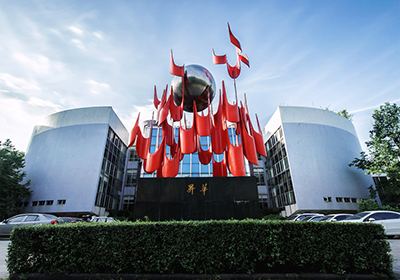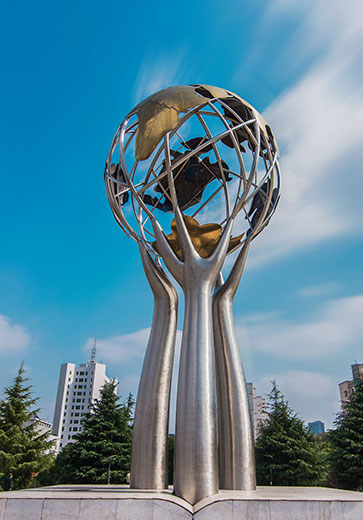Overview

CSU - A Key University Directly under the MOE
● One of the earliest universities admitted into "Project 211"
● One of the first-class universities jointly built by the Ministry of Education (MOE) and the province in "Project 985" and initiators of "Plan 2011"
● One of the A-Level world-class universities since September 2017
● One of the universities included in the second list of the "Double First-Class Initiative" since February 2022
Yi Hong, Current Secretary of CPC Committee of CSU, and Li Jiancheng, President of CSU
Central South University (CSU), located in the historical and cultural city of Changsha, Hunan Province, China, spans an area of 3.17 million square meters. Graced by the majestic Yuelu Mountain and overlooking the meandering Xiang River, CSU boasts an elegant and picturesque scene, is an ideal ground for academic pursuit. The University comprises 31 secondary colleges, boasting 3 large Class A tertiary comprehensive hospitals that are comparable to the Peking Union Medical College Hospital - namely Xiangya Hospital, the Second Xiangya Hospital and the Third Xiangya Hospital - and Xiangya Stomatological Hospital. Besides, it also collaborates with six non-directly affiliated hospitals, namely Haikou Hospital, Hunan Cancer Hospital, Hunan Children’s Hospital, Changsha Hospital, Zhuzhou Hospital, and Changde Hospital that are affiliated with Xiangya School of Medicine.
CSU was formed in April 2000 through the amalgamation of three institutions - Hunan Medical University (HMU), Changsha Railway University (CRU), and Central South University of Technology (CSUT). The predecessor of CSUT was the Central South Institute of Mining and Metallurgy founded in 1952 and that of CRU was the Central South College of Civil Engineering and Architecture formed in 1953. Their main disciplines originated from Mining & Metallurgy and Civil Engineering - two disciplines of Hunan Industrial College established in 1903. The predecessor of HMU was Xiangya Medical University founded in 1914, which was one of China's earliest colleges offering Western medicine courses.
CSU has a rich history of over one hundred years as an educational institution. It actively responds to the reform of China's higher education system and advocates the principles of "Create Knowledge and Serve Society." Pursuing "Virtue, Truth, Perfection, Inclusiveness," CSU has made significant progress in its overall strength by adhering to its own operational characteristics and aligning with the major demands of the country and society. This progress has been achieved through teamwork, innovation, and a commitment to excellence.

CSU has established comprehensive disciplinary systems for Non-ferrous Metals, Medicine, Rail Transit and other disciplines. These systems cover 11 fields, namely Philosophy, Economics, Law, Education, Literature, Science, Engineering, Medicine, Management, Art, and Interdisciplinarity, with Military Science being embraced. As an independent degree-granting institution and reviewer, CSU has:
● 40 First-Level Disciplines authorized for the Doctoral degree
● 46 First-Level Disciplines authorized for the Master's degree
● 9 Programs authorized for the Professional Doctorate
● 30 Programs authorized for the Professional Master's degree
● 32 post-doctoral research centers
● 6 national key disciplines of First-Level
● 12 national key disciplines of Second-Level
● 1 national key discipline (in development)
● 61 national key clinical specialties
Mathematics, Materials Science and Engineering, Metallurgical Engineering, Mining Engineering, and Traffic & Transportation Engineering are included in the national "First-Class Disciplines." ESIs (Essential Science Indicators) of 19 disciplines—Materials Science, Engineering, Clinical Medicine, Computer Science, Chemistry, Pharmacology and Toxicology, Biology and Biochemistry, Neuroscience and Behavior, Mathematics, Molecular Biology and Genetics, Social Sciences, Immunology, Psychiatry and Psychology, Geoscience, Environmental Science and Ecology, Agricultural Science, Physics, Microbiology, Economics and Business - are among the top 1% in the world. Notably, the ESI of Materials Science, Engineering, Clinical Medicine, Computer Science, Chemistry, Pharmacology and Toxicology are among the top 1‰ worldwide.

CSU prioritizes talent cultivation and has established a strong faculty team to support this goal.
● 16 academicians of the Chinese Academy of Sciences and the Chinese Academy of Engineering
● 39 recipients of the National Science Fund for Distinguished Young Scholars
● 2,014 professors and personnel with corresponding senior professional titles
● 355 experts who enjoy the special government allowance
● 3 Huang Danian-Style Teacher Teams among Chinese Universities
CSU values moral education and high-quality cultivation, so it has been exploring and enhancing its talent training model.
● 62,000+ full-time students
● 35,000+ undergraduates
● 24,000+ graduate students
● 2,200+ overseas degree students
CSU has 104 undergraduate programs and 89 open for enrollment, among which there are 72 national first-class ones. The university boasts 84 national first-class undergraduate courses. 39 of its programs and courses have won the National Teaching Achievement Award, 4 ideological and political demonstration programs of national courses, and 4 first prizes of national teaching competitions. Since it took the lead in setting up the innovation-oriented experimental class for advanced engineering talents, it became a pilot university implementing MOE's education and training program for excellent engineers, physicians and legal talents. CSU is one of China's earliest pilot universities included in the "Pilot Program for the Enrollment Reform of Basic Disciplines" and offers eight-year medical education (Doctor of Medicine). It is among the first universities to build high-level schools of public health, and the first regular university to cultivate “command-and-skill-integrated” active-duty officers in a graduate program. CSU is also the first higher educational institutions to implement MOE’s Graduate Education Innovation Program and “State-funded Postgraduate Overseas Study Program.” Moreover, it is the first universities allowed to grant a doctoral degree of engineering and the first pilot universities to implement the “National Outstanding Elementary and Secondary Teacher Training Plan.” In addition, CSU is included in China's first model universities experienced in graduate employment, and the first list of national reforming demonstration universities for deepening innovation and entrepreneurship education. It is one of the national demonstration bases for mass entrepreneurship and innovation.
CSU is committed to aligning its efforts with the major demands of the country and society. In pursuit of this goal, the university actively drives collaborative innovation and serves the development of the national economy and the modernization of national defense.
It has 31 national-level scientific research platforms, of which 17 are designated as source think tanks of the Chinese Think Tank Index (CTTI). Since 2000, CSU has won 112 national Three Major Awards for Science and Technology (Award for Natural Sciences, Award for Technological Invention and Award for Scientific and Technological Progress). Among them, there are 18 first prizes, including special prizes and innovative team prizes, of national science and technology. 10 projects have been selected into the "Top Ten Progresses in Science and Technology Made by Chinese Colleges and Universities." Besides, CSU is included in the first batch of the National Intellectual Property Pilot Demonstration Colleges and Universities.

CSU is open to frequent international cooperation and exchanges. It is one of the first batch of colleges and universities in China passing the education quality accreditation for international students. It has established long-term cooperation with 280 universities and research institutes in 54 countries and regions, such as the United States, the United Kingdom, Australia, Canada, Japan, France, Germany and Russia. CSU has also been extensively engaged in industry-university-research cooperation with a large number of multinational enterprises. Besides, it has initiated and joined 16 international university alliances. It has 12 National Discipline Innovation and Talent Introduction Bases, 1 Chinese-foreign collaborative educational institution, 3 Chinese-foreign collaborative projects, and 2 Confucius Institutes.
CSU unwaveringly embraces the socialist direction and upholds the president accountability system under the guidance of the CPC Committee of CSU. Besides, the university comprehensively enhances its scientific party-building and ideological and political work. These collective efforts provide CSU with a solid ideological, political, and organizational foundation for stable reforms and development. CSU has been honored with several prestigious titles at the national level. These include being named the National Advanced University in Party Building and Ideological and Political Work, the National Advanced Organization in Cultural and Ethical Advancement, the National Advanced and Typical Organization in Ideological and Political Work at the Primary Level, and the National Civilized Campus.
Throughout its building and development, CSU has received care and full recognition from the CPC and the head of state. In recent years, CSU has had the privilege of playing host to over 50 heads of the CPC and state, including 10 members of the Standing Committee of the Political Bureau of the Central Committee. Distinguished leaders, such as General Secretary Xi Jinping, have visited CSU and spoken highly of the university's reforms, innovation, talent cultivation, scientific research, and social services.
As a cradle of talents, CSU shoulders the historical responsibility of China's high-level university construction. Based in Hunan, it fosters national and global insights. The university will accelerate its high-quality connotative development to grow up into a world-renowned university with its own characteristics and make greater contributions to the full realization of a modern socialist China and the great rejuvenation of the Chinese nation!

(Data collected before May 20 2024)










